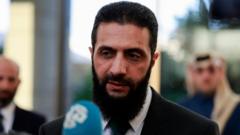Syria's political landscape is in flux following the recent departure of Bashar al-Assad, with rebel leader Ahmed al-Sharaa, head of Hayat Tahrir al-Sham (HTS), stating that re-establishing a functional electoral system may require a four-year timeline. In an interview aired on Saudi state television Al Arabiya, Sharaa explained that drafting a new constitution could span nearly three years, while significant improvements in public services and stability might not materialize for at least a year.
Sharaa emphasized the necessity of rebuilding Syria's legal framework and conducting a comprehensive population census to legitimize forthcoming elections. His comments provide the first specific timeline from HTS since they led an offensive that resulted in Assad's removal. The question remains on how HTS, a group that once engaged in violent extremism but has since moderated its stance, will govern Syria—a nation characterized by its ethnic diversity, comprising Kurds, Armenians, Assyrians, Christians, Druze, Alawite Shia, and Sunni Arabs.
During the interview, Sharaa addressed concerns surrounding the transitional administration, asserting that recent appointments were critical for inclusivity and not meant to marginalize any group. The upcoming national dialogue conference is touted as a pivotal moment for Syria to unify after over thirteen years of civil strife, although specifics about the conference remain under wraps.
In parallel developments, reports indicate that nearly 300 individuals linked to Assad's regime were arrested during a crackdown, highlighting ongoing tensions in the region. Observers note that this wave of detentions, which reportedly involved local cooperation, signals a continuous struggle for power within the shifting political landscape as Syria seeks to navigate its post-war future.





















